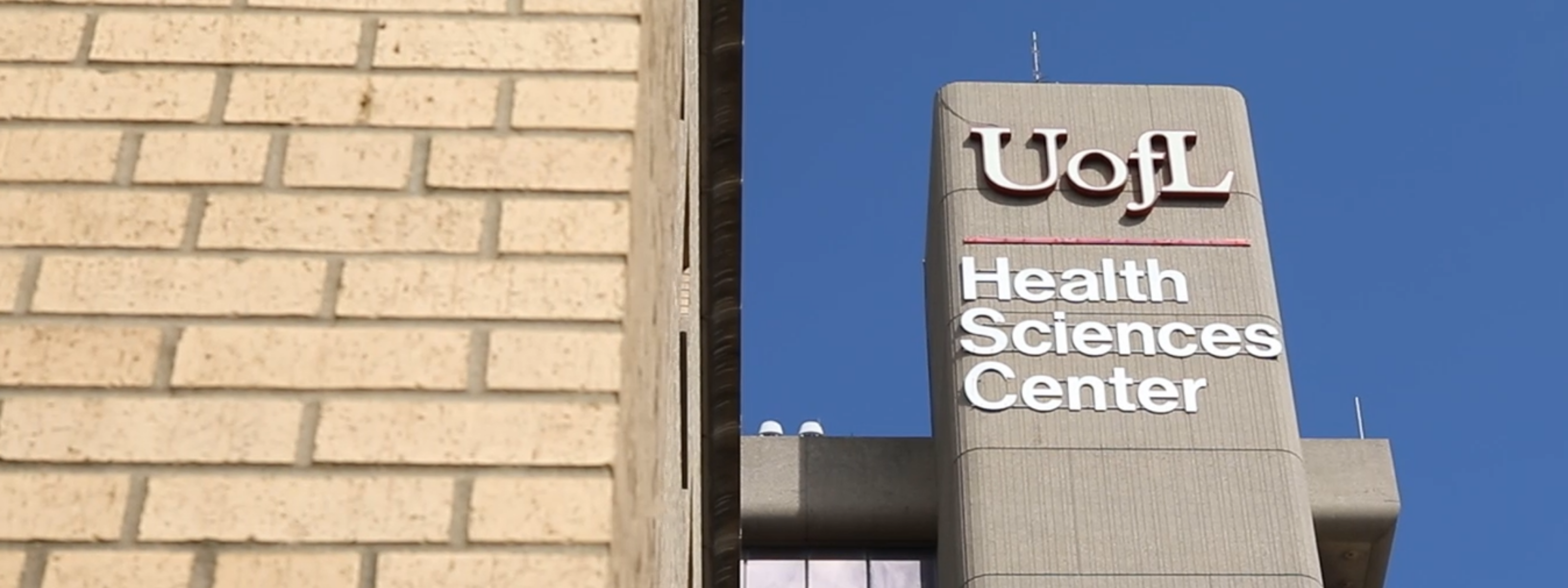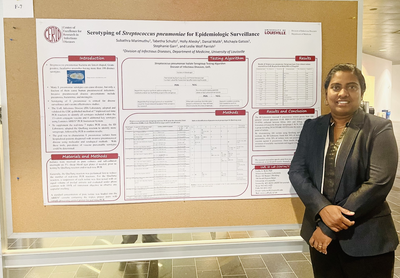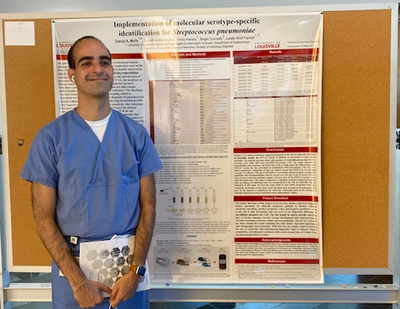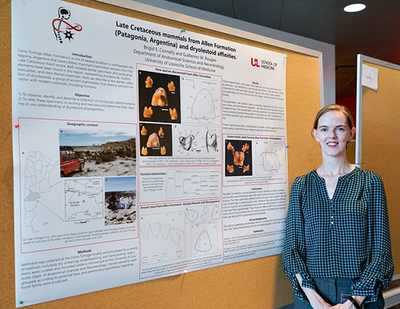News

Collaborations
October 17, 2024 | Collaboration Leads to Publication
For the past five years the U of L Infectious Diseases Laboratory has collaborated with researchers from the U of L Department of Cardiovascular and Thoracic Surgery, the Department of Chemical Engineering, U of L Speed School of Engineering, and the UofL Comparative Medicine Research Unit to develop a porcine pneumonia model to detect biomarkers of infection from exhaled breath. In the Fall of 2023, the hard work and dedication of all those involved in this collaborative effort culminated in a publication presented in the Journal of Thoracic and Cardiovascular Surgery (JTCVS) Open, an open access peer reviewed journal. Please refer to the following journal article for more details.
Gianna Katsaros, Susan Ansley Smith, Sienna Shacklette, Jaimin Trivedi, Stephanie S Garr, Leslie Wolf Parrish, Zhenzhen Xie, Xiao-An Fu, Karen Powell, George Pantalos, Victor van Berkel. Identification of a marker of infection in the breath using a porcine pneumonia model. JTCVS Open, Volume 16, 2023, Pages 1063-1069, ISSN 2666-2736. https://doi.org/10.1016/j.xjon.2023.10.025. (https://www.sciencedirect.com/science/article/pii/S2666273623003431)
The University of Louisville Infectious Diseases Laboratory explores testing non-traditional samples for SARS CoV-2 to determine the prevalence of the virus within these samples and to support local epidemiology studies. A real-time reverse transcription-polymerase chain reaction (RT-PCR) assay originally validated for NP specimens was used for non-traditional specimen types using a variety of specimen preparation methods.
October 26, 2022 | University of Louisville Infectious Diseases Laboratory Investigates Seroprevalence of Powassan Virus in Louisville Metropolitan and Southern Indiana Areas
The UofL ID Lab has a long history of testing for tickborne diseases in our region, serving as a reference laboratory for hospital systems in the metro Louisville and southern Indiana areas. Our menu has evolved over the years to incorporate the most appropriate methods for detecting infectious diseases such as Lyme disease, Ehrlichiosis, Anaplasmosis and Rickettsiosis (Spotted Fever Group and Typhus Group). The ID Lab currently uses serological methods for Lyme disease and Rickettsiosis, and molecular methods for Ehrlichiosis and Anaplasmosis. We began a study to investigate the seroprevalence of antibodies to Powassan virus in 2022.
Powassan virus is a flavivirus transmitted to humans by Ixodes scapularis ticks. In the US, it has been reported most in the upper Midwest and in the Northeastern regions of the US (1). Many people have subclinical infections, but those that do develop acute symptoms show signs of infection between 1 and 4 weeks after a tick bite. Encephalitis and meningitis are serious outcomes of infection, with persons having seizures, confusion, loss of coordination and difficulty talking. There is a 10% mortality rate, and of those with severe infections that survive, 50% have long-term symptoms of recurring headaches, loss of muscle mass, strength and memory problems (2).
Laboratory diagnostic testing for Powassan virus infection has limited availability, typically only through the CDC, certain public health laboratories, or other specialized reference laboratories. As with many vector-borne diseases, signs and symptoms, history of tick bite and travel history are considered, along with all laboratory test results. Laboratory diagnosis consists of testing serum or CSF from suspect patients using an IgM capture enzyme immunoassay with confirmation by a plaque reduction neutralization assay (PRNT). Some laboratories offer reverse transcription PCR on serum, CSF, or tissue in the acute phase of disease (3).
There has been a general increase in tickborne diseases in the United States since 2001 due to many factors, such as expansion of host range and climate change. Powassan virus disease has been on the nationally notifiable disease list since 2005, as compared to Lyme disease which has been reportable since 1991 (4). While the general public and physicians may be aware of Lyme Disease and Rocky Mountain Spotted Fever, there is a lack of awareness about emerging or re-emerging tickborne diseases such as Ehrlichiosis, Anaplasmosis, Babesiosis and Tularemia. According to the CDC and ArboNet, Powassan virus neuroinvasive disease has steadily increased between 2010 and 2019, with an average of 17 cases per year (range 6-39), with Minnesota (38), Wisconsin (30) and Massachusetts (31) being among the top three states between 2010 and 2019 (1).
In Kentucky, the more commonly reported tickborne diseases are Ehrlichiosis, Rocky Mountain Spotted Fever and Lyme disease. Because Lyme disease is transmitted by the same tick vector as Powassan virus, it is of interest to investigate if Powassan virus disease occurs in Kentucky. In the last three years the Kentucky Department for Public Health (KY DPH) has been performing environmental surveys to document tick species present in the state. Per Erica Brakefield (personal communication) from the Environmental Health Branch in the KY DPH, the Ixodes scapularis tick is present in Kentucky, and Lyme disease cases have been on the increase since 2013 in our state (5).
References
- CDC, Powassan Virus, “Statistics & Maps” accessed 8/2/2021 at https://www.cdc.gov/powassan/statistics.html
- CDC, Powassan Virus, “Symptoms, Diagnosis, and Treatment” accessed 8/2021 at https://www.cdc.gov/powassan/symptoms.html
- CDC Powassan Virus for Health Care Providers, “Diagnostic Testing” accessed 8/2/2021 at https://www.cdc.gov/powassan/diagnostic-testing.html
- CDC, National Notifiable Diseases Surveillance System, Surveillance Case Definitions, “Arboviral Diseases, Neuroinvasive and Non-neuroinvasive” accessed 8/2/2021 at https://ndc.services.cdc.gov/conditions/arboviral-diseases-neuroinvasive-and-non-neuroinvasive
- Kentucky Department for Public Health, “Tickborne Diseases in Kentucky” story map accessed 8/2/2021 at https://kydph.maps.arcgis.com/apps/Cascade/index.html
Press Releases
As COVID-19 began to spread in early 2020, scientists and medical professionals across the world began quickly responding to community needs, shifting priorities to help understand and address the pandemic.
May 2020 | Hard at work, U of L scientists hope research will yield a COVID-19 cure
At the Kosair Charities Clinical and Translational Research Building in downtown Louisville, something big is happening that makes Kevin Gardner glow with pride. Inside the sleek glass building, researchers are hard at work trying to beat the novel coronavirus by outsmarting it.
January 2018 | University of Louisville Infectious Disease Lab & ARIES®
The U of L ID Lab and Luminex have a long-standing relationship that began nearly ten years ago with the adoption of a multiplex respiratory assay that used xTAG® Technology. Over the years, the lab has adopted additional Luminex Systems, with the ARIES® System being the most recent.
Faculty and Staff Highlights
October 6, 2023 | Dr. Marimuthu Wins Award at Research!Louisville 2023
 Congratulations to Dr. Subathra Marimuthu for winning the Faculty Clinical Science Award at Research!Louisville 2023. Dr. Marimuthu presented a poster that included research results of Serotyping Streptococcus pneumoniae for Epidemiologic Surveillance. Additional authors included Tabetha Schultz, Holly Aliesky, Danial Malik, Michayla Gatsos, Stephanie Garr, and Dr. Leslie Wolf Parrish.
Congratulations to Dr. Subathra Marimuthu for winning the Faculty Clinical Science Award at Research!Louisville 2023. Dr. Marimuthu presented a poster that included research results of Serotyping Streptococcus pneumoniae for Epidemiologic Surveillance. Additional authors included Tabetha Schultz, Holly Aliesky, Danial Malik, Michayla Gatsos, Stephanie Garr, and Dr. Leslie Wolf Parrish.
In addition, Dr. Marimuthu has been invited to the 2024 University of Louisville School of Medicine Faculty Leadership for Inclusion and Growth in Health by Transformation (FLIGHT) program. This program is designed to support faculty and future faculty from underrepresented backgrounds navigate academia for success.
September 23, 2022 | ID Laboratory Team Poster Presentations Featured in Research!Louisville 2022
Two personnel with the Infectious Diseases Laboratory, one former and one current, presented posters of their research during Research!Louisville, an annual symposium for health sciences research which ran from September 19-23, 2022.
 Danial Malik is a former Research Technologist II with the ID Laboratory and recently obtained his Master's degree in UofL's School of Public Health. He worked on the S. pneumoniae PCR and molecular serotype research project along with other research personnel and presented a poster of the results and conclusions for the project at Research!Louisville. His future plans include applying to medical school in hopes of starting next fall.
Danial Malik is a former Research Technologist II with the ID Laboratory and recently obtained his Master's degree in UofL's School of Public Health. He worked on the S. pneumoniae PCR and molecular serotype research project along with other research personnel and presented a poster of the results and conclusions for the project at Research!Louisville. His future plans include applying to medical school in hopes of starting next fall.
 Brigid Connelly is a Research Technologist II with the ID Laboratory and a current Master's student pursuing her degree in the Department of Anatomical Sciences and Neurobiology. She presented a poster for the department of ASNB and hopes to get the opportunity to pursue field work as she completes her studies. In addition, Brigid also worked on the S. pneumoniae PCR and molecular serotype research project.
Brigid Connelly is a Research Technologist II with the ID Laboratory and a current Master's student pursuing her degree in the Department of Anatomical Sciences and Neurobiology. She presented a poster for the department of ASNB and hopes to get the opportunity to pursue field work as she completes her studies. In addition, Brigid also worked on the S. pneumoniae PCR and molecular serotype research project.
January 2022 | New Hire, Tabetha Schultz, joins team as a Research Technologist II
The Infectious Diseases Laboratory has hired a new member of their staff, Tabetha Schultz, Research Technologist II. Tabetha recently graduated from the University of Louisville with a bachelor’s degree in Biology and Mathematics. Her primary role will be to support the on-going clinical research and collaborations in the Infectious Diseases Biorepository, but she will also support clinical testing efforts within the Infectious Diseases Laboratory. Originally, she started working for the Infectious Diseases Division as an undergraduate research assistant where shefirst volunteered at Broadbent Arena during the mass COVID-19 vaccination event. “I think working with Kim Buckner and the team on different research projects made me realize how fun it truly can be. She then introduced me to the lab and the experience has deepened my appreciation. She talked about the IDL laboratory often and the "sweet ladies" that work there. Kim led me into the world of fun research!”
August 2021 | Dr. Subathra Marimuthu PhD, MB (ASCP) joins team as Assistant Clinical Professor
Dr. Subathra Marimuthu PhD, MB (ASCP) Director of the UofL Infectious Diseases Biorepository became an assistant professor and University of Louisville faculty member in August 2021. Dr. Marimuthu oversees the daily operation of Infectious Diseases Biorepository located within the Infectious Diseases Laboratory at the Delia Baxter Building II room 113, 580 South Preston Street, Louisville, KY 40202. Additionally, she plays a key role in laboratory developed clinical testing; for example, Atypical Pneumonia Panel, Pan-Ehrlichiosis and Anaplasmosis PCR, Pneumocystis jirovecii PCR, SARS CoV-2 PCR, and PCR for chlamydia and gonorrhea infections. She is currently overseeing the development and validation of the S. pneumoniae PCR and serotyping test.
Dr. Marimuthu began her career at the University of Louisville in 2013 as a Senior Research Associate in the Department of Pharmacology and Toxicology and in 2015 secured a position with the Infectious Diseases Division as a Clinical Research Coordinator. In 2018, Dr. Marimuthu was named the director of the UofL Infectious Diseases Biorepository. She has worked diligently to further her career at the University and attributes her mentors, Dr. Julio Ramirez MD, Dr. Forest Arnold DO, MS. Msc. FIDSA, Dr. James Summersgill PhD, and Dr. Leslie Wolf PhD, HCLD (ABB) for her success. Dr. Marimuthu has authored or co-authored more than 20 peer reviewed publications.
Team Biography | Laura Schindler, MT (ASCP), Manager Infectious Diseases Reference Laboratory
Laura earned her Bachelor of Science from Miami University (OH) and a Bachelor of Science in Medical Technology from Spalding University in Louisville, KY. She is a certified medical technologist. Laura started her career with the Infectious Diseases Laboratory in 1991. She assisted Dr. James Summersgill, PhD with the development of PCR testing for the Infectious Diseases Laboratory in the mid 1990’s and early 2000’s. The primary focus was developing molecular based testing for atypical pneumonia pathogens such as Mycoplasma pneumoniae, Legionella pneumophila, and Chlamydia pneumoniae. Additionally, during that time, she and the Infectious Diseases team collaborated with several pharmaceutical companies, namely Bristol Myers Squibb, Parke Davis and Abbott among others, to perform research that is still relevant today. Several studies involved providing atypical pneumonia pathogens and their serological test results to those pharmaceutical companies interested in developing potential antibiotics to combat Community Acquired Pneumonia (CAP). More recently, she has contributed to several studies including the new test development of S. pneumoniae and Legionella urinary antigen for Immuview®, RETOS I and II, and SIPS. Laura has managed the day-to-day operations of the clinical laboratory for over 20 years and has enjoyed seeing it grow from a staff of two to a staff of eight with the expansion of the Infectious Diseases Biorepository in 2005.
Team Biography | Karen Campbell Garth, MT (ASCP), Senior Medical Technologist
Karen earned her Bachelor of Science in Medical Technology from Indiana University. She is a certified medical technologist and has over forty years of experience as a clinical microbiologist and molecular technologist. She started her career with the Infectious Diseases Laboratory in 2001. She assisted Dr. James Summersgill, PhD with the development of molecular based testing for atypical pneumonia pathogens such as Mycoplasma pneumoniae, Legionella pneumophila, and Chlamydia pneumoniae. Today, these tests are still performed in the Infectious Diseases Laboratory on more advanced and evolved platforms. In the early 2000’s, she and the Infectious Diseases team worked closely with several pharmaceutical companies to provide atypical pneumonia isolates and their corresponding serological results for those looking to develop new antibiotics to combat community acquired pneumonia (CAP). Karen retired from the IDL laboratory in 2013. In March of 2020, when the SARS COVID-19 pandemic broke out, Karen was instrumental in providing emergency staff support to help combat the tremendous workload. She has continued to provide part-time support for clinical testing and new test development.
Team Biography | Stephanie Sabrena Garr, MT (ASCP), Senior Medical Technologist
Sabrena earned her Associate degree in Clinical Laboratory Science from Jefferson Community College (UK) and a Bachelor of Arts in Biology from the University of Louisville. She is a certified medical technologist and has over thirty years of experience as a clinical microbiologist and molecular technologist. She started her career with the Infectious Diseases Laboratory in 2009. Her primary role has been to support the clinical laboratory in the development and testing of molecular platforms for atypical pneumonia pathogens, anaplasma and pan-ehrlichia, SARS CoV-2, CT/NG, and serological testing for mycobacteria tuberculosis for latent and active TB, lyme disease, rickettsia spotted fever and typhus groups, and syphilis. She has also supported several clinical research studies such as the Janssen’s Johnson and Johnson SARS CoV-2 vaccine study, the Ex Vivo Lung Perfusion (EVLP) project, the new test development of S. pneumoniae and Legionella urinary for Immuview®, RETOS I and II, and SIPS. In addition to clinical testing and research, Sabrena has taken on additional projects to help promote and market the clinical laboratory and Biorepository by updating the IDL website, creating a test menu booklet and the test requisition form. She is also involved in quality assurance and statistical data for the QFT-TB Gold Plus test.
Team Biography | Holly Aliesky, Research Technologist II
Holly earned a BSc Honours degree in Genetics with an emphasis in Immunology from the University of Aberdeen in Scotland. Holly's 20 years of basic science research have taken her on a journey from the UK to her native Vermont, and on to Los Angeles where she spent the bulk of her career at Cedar-Sinai Medical Center managing the Thyroid Autoimmune Disease Unit. Life and family brought her to Louisville. The pandemic gave her the opportunity to join the Infectious Diseases Laboratory on an emergency basis for community RT-PCR COVID-19 testing. She became a full-time member of both the clinical and research staff in October 2020. Her notable past achievements were 15 years at Cedar-Sinai Medical Center researching autoimmune thyroiditis where she was the laboratory manager and part of a team that created the first spontaneous mouse model of Graves' Disease. She has worked in Scotland, Italy & the United States researchingGyrodactylus, humans and non-human primates and has coauthored 40+ peer-reviewed scientific publications. More recently, Holly has supported the Infectious Diseases Biorepository with several studies including the Janssen Johnson and Johnson SARS CoV-2 post vaccine study, the COVID-19 Breath Analysis study, the SARS CoV-2 samples study, and the new test development of the identification and serotyping of S. pneumoniae by PCR.